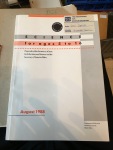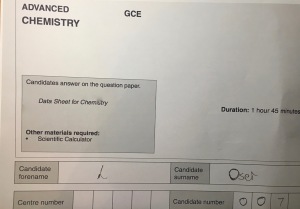This week I had the privilege of speaking to the PGCE mentors at Nottingham University about subject knowledge. We were trying to think about the importance of subject knowledge when training teachers compared to all the other pedagogical an
d classroom management that goes on in helping shiny new teacher trainees as they learn the craft of the classroom. The stuff that inevitably has to go on – behaviour management, question technique etc made me think about the importance of subject knowledge in learning to be a teacher . You need a big erudite quote talking to a load of PGCE mentors at a prestigious University so I went for a Cloughie quote. “Players lose you games not tactics. There is so much crap talked about tactics by people who barely know how to win at Dominoes.” This made me think because Clough’s point really is that there are all sorts of people with opinions and views telling him how to run his team but actually it is players that win games. As a head teacher I am acutely aware we get all sorts of advice, guidance and “this is how to” BUT it is teachers that make a difference.
. You need a big erudite quote talking to a load of PGCE mentors at a prestigious University so I went for a Cloughie quote. “Players lose you games not tactics. There is so much crap talked about tactics by people who barely know how to win at Dominoes.” This made me think because Clough’s point really is that there are all sorts of people with opinions and views telling him how to run his team but actually it is players that win games. As a head teacher I am acutely aware we get all sorts of advice, guidance and “this is how to” BUT it is teachers that make a difference.
- teachers not systems
- teachers not policies
- enthusiastic, inspiring and knowledgeable teachers.
Policies and systems are important but no one decides to become a teacher because of policies and systems, they decide to become a teacher because they were inspired by a teacher or by a subject or both; they love children and now they have a subject they wish to share. My audience were present as PGCE mentors because of a deep desire to help the next generation of teachers, to create more teachers and we head teachers like to find inspiring knowledgeable shiny new teachers.
Some Subject Knowledge Myths
Graduates know everything about their subject when they graduate as though the things they didn’t quite understand when they went into finals having got their 2:1 or even 1st somehow mysteriously drop into the brain. The 30% you got away without knowing is now “in the brain” Well it sure isn’t! After graduation I did one year of reseach and in my first day of lab work used a chemical (Benzoyl Chloride for those interested] which was described as a powerful lachrymator, but me and my arrogance not wanting to check at what lachrymator meant just assumed it was the word that meant you went to the toilet a lot. so I took care not to drink or taste it [not difficult] having completed my experiment threw my solution down a sink to find a whole lab of chemists with tears streaming down their faces having to leave the room and as we were evacuated me being totally embarrassed. No the gaps of knowledge are not filled in!
Graduates knowledge automatically updates as the world discovers more about that subject new gaps occur. Or maybe some part of history you have to teach wasn’t covered in HE. Or suddenly as an English teacher you have to understand the new 19th century novel thanks to Mr Gove designing the spec. This can be seen as nuisance or you can have the attitude of my brilliant English staff and see it as a chance to read stuff you haven’t read before.
 The school curriculum, the school content never changes hey have in my subject I can tell you a topic like Solubility has come and gone and came back it. The Born Haber cycle was in then out then back in a new form then gone and I’ve not checked the new specs!
The school curriculum, the school content never changes hey have in my subject I can tell you a topic like Solubility has come and gone and came back it. The Born Haber cycle was in then out then back in a new form then gone and I’ve not checked the new specs!
Some Subject Knowledge Truths
Graduates know more about their subject than school students. We hope that’s true after 3 years and £27,000 and all of us should be able to keep ahead on knowledge
Graduates worry about other aspects of the classroom. Shine new ITT people have other bothers:
- Will the pupils behave
- Will I cope with the marking, feedback, will I even be able to answer the exam question myself
- Will their parents moan about me
- Will my classroom turn into an example of chaos and riot
- Agh should I be a teacher
It’s n ot just about knowledge. Back in the day when I did a PGCE we had what we called books and if you were asked a question the answer was in a book so you found it there or bluffed. Now you can google it, so can pupils, but learning is much deeper matter and, it’s really all about
ot just about knowledge. Back in the day when I did a PGCE we had what we called books and if you were asked a question the answer was in a book so you found it there or bluffed. Now you can google it, so can pupils, but learning is much deeper matter and, it’s really all about
- Understanding,
- reasoning,
- application,
- synthesis …..maybe more
Knowledge has to fit into a curriculum. Whatever knowledge the graduate has or does not have the demand is in a curriculum be that for Y7 for Y9 top sets or for GCSE or Level and maybe when we get this wrong we underestimate our pupils and maybe there is truth in the Ousted chiefs criticisms of the way we work with bright pupils
Graduates should be able to make a subject “come to life”. OK there is a curriculum but get the best bits of your subject, the exciting and interesting stuff into the lesson. Children love this and if we keep winning them over they will enjoy the lesson, learn and see they can progress. That is the virtuous circle of success
Stay in the mainstream of being a subject specialist. I am a reasonable Chemist ( hey Ive a degree and an FRSC) Im an OK Chemistry teacher- but when you give me KS3 biology I can kill it. I never did any Biology, in my day an all boys grammar didn’t do Biology.

Sir I don’t think you know how to use this microscope
A few challenges
Pupil growth in understanding mirrors yours. There are always better ways to teach better ways to work out how to deliver your subject after a few years of working out that this be the topic doesn’t get a learnt very well in that particular way we is the subject experts can probably sit down and find a better way. in the 80’s I taught Chemistry the same way I had been taught and the same route as my degree. By the time of Salters I was teaching JUST the part needed at a particular stage, we revisited ideas, we did ideas in a circular way that genuinely held learning and it meant we revisited Chemical ideas. It worked and worked well and we saw that in results in numbers carrying on in the subject and guess what – we saw it in their understanding. Avoid the errors of dropping really difficult concepts and ideas on pupils too early in their learning before they are mature enough to cope.
Importance of the story of the subject (even Maths). All subjects even Maths have a story to tell – a history, a set of characters, set of discoveries, a context, a baddie a discovery. I can name you all these in Chemistry. Have a fund of stores or look at my post on storytelling.
Importance of secu re understanding not teaching to test – PPS (past paper syndrome). No teacher reading this hasn’t had the frustration of a pupil asking “whats in the test?” or doing past papers sometime in January and not doing very well. We need to use our own deep understanding of our subject to show pupils just how to grasp, understand, learn and progress.
re understanding not teaching to test – PPS (past paper syndrome). No teacher reading this hasn’t had the frustration of a pupil asking “whats in the test?” or doing past papers sometime in January and not doing very well. We need to use our own deep understanding of our subject to show pupils just how to grasp, understand, learn and progress.
No point doing exam papers (yet) be secure in your knowledge and understanding) and sure we might have to do some simple testing to see if you have and to see how we help.
Using new technologies. I love what I have in the toolbox for teaching so we must keep an eye on ICT or Activites to enhance BUT we use out subject knowledge. I’m reminded of some of the early software I was shown by enthusiastic software salesmen aiming to show me how wonderful chemistry could appear on the interactive whiteboard. Watch! You can pull a virtual bottle of acid from here and look you can pull across test tube and choose a bit of zinc or other metal to add. Now, drop it in and click here to open the bottle and look the equation is written underneath and there is the reaction: some bubbles of hydrogen the pupils can guess what it is and the little splint will come over and on  the screen appears the word “pop” what do you think of that? It’s quite nice but I’d rather g
the screen appears the word “pop” what do you think of that? It’s quite nice but I’d rather g
et a bottle of acid out give it to my pupils and a test tube and let them do the pop test to see the delight in their faces and the motivation which will probably drive them to work out the equation ready for tomorrow when if they’ve worked it out they can do a few more themselves in real life. Use technology but use your subject common sense
Importance of the keepy uppy in your subject there is the obvious importance of keeping up in the subject and chemistry as in most subjects things has seen dramatic changes. Nanotechnology didn’t exist back in the 80’s. We need to ke ep up with our knowledge, we should enjoy that. It will get us excited: a new material anew discovery, scientist on the international space station. I teach my pupils about DNA and the structure and hydrogen bonding and it’s fascinating and actually give them the 1953 article (a single side of A4 paper) that was in nature and I remind them that in
ep up with our knowledge, we should enjoy that. It will get us excited: a new material anew discovery, scientist on the international space station. I teach my pupils about DNA and the structure and hydrogen bonding and it’s fascinating and actually give them the 1953 article (a single side of A4 paper) that was in nature and I remind them that in
1953 this won a Nobel Prize and in 2016 it might get them three marks in an exam.Surely there is nothing more important than us keeping up our frontier knowledge to excite and inspire the next generation – cos someone did that for us , a teacher a copy of New scientist a TV programme. Get in touch with your professional subject: ASE or RSC for me.
Delight of discussion of your subject. one of the best parts of the teacher’s job is spending time in the staffroom or on CPD opportunities OR with pupils, talking through some of the issues. How can we make this better? What does this mean? Did you know that? Have you seen this? Hey and if you can draw in other staff, the renaissaince people in te staffroom then the discussion makes the job richer, and all the better
Lifelong learning. You and I dream of creating lifelong learners, and we are lifelong learners of our sunbelt. Use the vehicle of your subject knowledge to sign the deal.
Some Questions
Q1 what importance does your ITT, NQT RQT or frankly your CPD programme place on Subject Knowledge?
Q2 Have we neglected subject knowledge at the expense of pedagogy and lost out
Q3 Should we try and wrestle subject knowledge back to being the “first love”?
I got very little subject knowledge delivered in my PGCE. The only thing very focused on it was a module requiring us to research the pedagogical history and policy development of our subject area. This was driven individually and as we PGCE students were all teaching different disciplines, nothing was delivered by the ITT team. It’s now left me considering what subject specific MA courses I will follow. I’m looking forward to it. I can see myself busy with that kind of CPD for the next three to six years as there are quite a few MA courses of relevance and appeal. I’ll probably have to self fund though.
LikeLike
I hope that is changing. My talk was for Nottingham PGCE so they had long discussions with mentors about helping with SK. You can tell from my post I think it’s critically important and just a good thing to be discussing with clever colleagues and pupils and helping maintain and foster our own interests.
Good wishes with the masters, a nice thing to do but as you say choosing carefully.
LikeLiked by 1 person
I totally agree. Keep it academically alive. Otherwise we just turn into training bots. Thank you, I’m enjoying exploring the range 🙂 I’d like the DfE to pay tho lol.
LikeLike
Not unreasonable – maybe the teaching alliance?
LikeLike
Thank you for the tip. I’ll look into it!
LikeLike
Reblogged this on The Echo Chamber.
LikeLike
Hello John – there was masses of wisdom in this post and I’m glad I found your blog. The content of this particular post was particularly welcome, as it seems that people pushing the value of teacher subject knowledge are thin on the ground for some reason!
I wrote this blog post about the matter during last year which seemed to strike a cord: https://steppingbackalittle.wordpress.com/2015/05/10/remodelling-the-ideal-teacher-sage-2-0/
Although as a deputy in an independent Prep school many posts are beyond my immediate sphere, I’ll keep following!
Chris
LikeLike
Thanks for getting in touch and the comments. Your post is more forensic and detailed and well written, thanks for sharing.
LikeLike